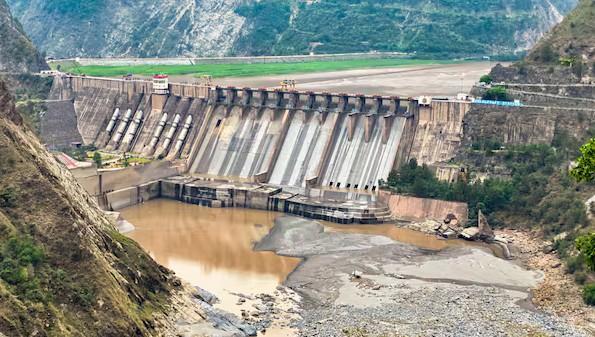
Pak regions see 20% drop in water flow as India keeps IWT on hold
The Indus Waters Treaty (IWT) between India and Pakistan has been a cornerstone of their bilateral relations, governing the sharing of the waters of the Indus and its tributaries. However, the recent decision by India to put the treaty on hold has sent shockwaves across the region, particularly in Pakistan. In a worrying trend, three regions of Pakistan are reportedly witnessing a 20% drop in flow of rivers as compared to last year.
The Punjab region, which is the breadbasket of Pakistan, is seeing a significant reduction in water flow. According to reports, the flow in Punjab stands at 1,10,500 cusecs (cubic feet per second), down from 1,30,800 cusecs on the same date last year. This decline is not only alarming but also has significant implications for the region’s agriculture, which is the backbone of Pakistan’s economy.
The Sindh region, which is the most populous province in Pakistan, is also experiencing a significant drop in water flow. The flow in Sindh has reduced to 1,33,000 cusecs from 1,70,000 cusecs on the same date last year. This reduction in water flow has already started to affect the region’s agriculture and industry, and if left unchecked, could have devastating consequences for the region’s economy.
The Khyber Pakhtunkhwa (KP) region, which is known for its lush green valleys and fertile plains, is also seeing a decline in water flow. The flow in KP has reduced to 1,20,000 cusecs from 1,50,000 cusecs on the same date last year. This reduction in water flow is not only affecting the region’s agriculture but also its hydropower generation capacity.
The reasons behind this decline in water flow are attributed to India’s decision to put the IWT on hold. The treaty, signed in 1960, governs the sharing of the waters of the Indus and its tributaries between India and Pakistan. However, India’s move to put the treaty on hold has created uncertainty and anxiety among Pakistan’s water managers and farmers.
India’s decision to put the IWT on hold was taken in response to Pakistan’s decision to downgrade diplomatic ties and suspend trade with India after New Delhi revoked the special status of Jammu and Kashmir. Pakistan claimed that India’s move was a violation of the IWT and the United Nations (UN) charter.
Pakistan has been using the IWT to its advantage, accusing India of violating the treaty and withholding water from its rivers. Pakistan has been demanding that India release the water it owes under the treaty, but India has refused to do so, citing Pakistan’s failure to meet its obligations under the treaty.
The IWT is a complex agreement that governs the sharing of the waters of the Indus and its tributaries between India and Pakistan. The treaty was signed in 1960, after a prolonged dispute between the two countries over the sharing of the waters of the Indus. The treaty provides for the sharing of the waters of the Indus and its tributaries, with India being the upper riparian state and Pakistan being the lower riparian state.
Under the treaty, India is required to release a certain amount of water into the Indus and its tributaries, which flows into Pakistan. However, India has been accused of withholding water from Pakistan, citing the need to generate hydroelectric power and meet the needs of its own agriculture.
Pakistan, on the other hand, has been accusing India of violating the treaty and withholding water from its rivers. Pakistan has been demanding that India release the water it owes under the treaty, but India has refused to do so, citing Pakistan’s failure to meet its obligations under the treaty.
The IWT is not only important for the sharing of the waters of the Indus and its tributaries but also for the regional economy. The Indus River Basin is one of the most fertile and productive regions in South Asia, supporting the livelihoods of millions of people.
In conclusion, the recent decision by India to put the IWT on hold has sent shockwaves across the region, particularly in Pakistan. The decline in water flow in three regions of Pakistan is not only alarming but also has significant implications for the region’s agriculture and industry. Pakistan and India need to work together to find a solution to this crisis, which requires the sharing of the waters of the Indus and its tributaries.
Source:






